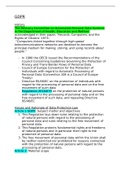Notes de cours
Notes on the GDPR (R_DAP)
- Cours
- Établissement
Detailed notes about the GDPR. Explanation of fundamental principles and rules for processing data. What is the GDPR for? What are the specific sections of the GDPR? What are the values and rationale of data protection laws?
[Montrer plus]



